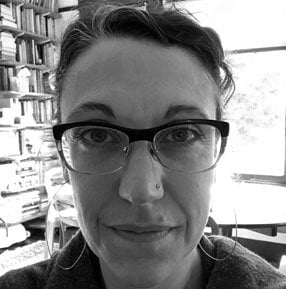So torn by my tides, I do not know I can read them. Hour book, our book. “H” in Italian is a tool, not a sound. My mother slips the “h” in only where it doesn’t belong. Our book, our book. How events just accumulate in time. Who will we lose in the duration of this writing. The promise of future children named for our beloved dead. Whispered at caskets. An hour dead. How many hours.
In our village the streets empty at appointed times. If life were a time-lapse video, lingering would be more visible than slipping away. Invisible motions the more pronounced. Once I stood akimbo, 8PM mid-street, waiting for everyone to go. I am astonished, in memory, by the boldness of it. Did everyone go?
How many ours.
Copyright © 2018 by Stefania Heim. Originally published in Poem-a-Day on November 30, 2018, by the Academy of American Poets.
“I love the homonyms ‘our’ and ‘hour’ because their juxtaposition speaks to the ways in which experiences of time are and are not communal. Together they make tangible both the desire for communication and its sometimes productive frustration. When I read this poem out loud, it’s not clear which [h]our I mean. What is possible to share with another person? On a more personal level, the word ‘hour’ is one my Italian mother, for whom the exercise of pronouncing h’s is entirely theoretical, has trouble remembering how to say. Like many children who grew up in more than one language, I credit much of my turn toward poetry to my early home life, which transpired in the slippages between tongues—the neologisms, the mistakes, the tactile experience of words.”
—Stefania Heim

